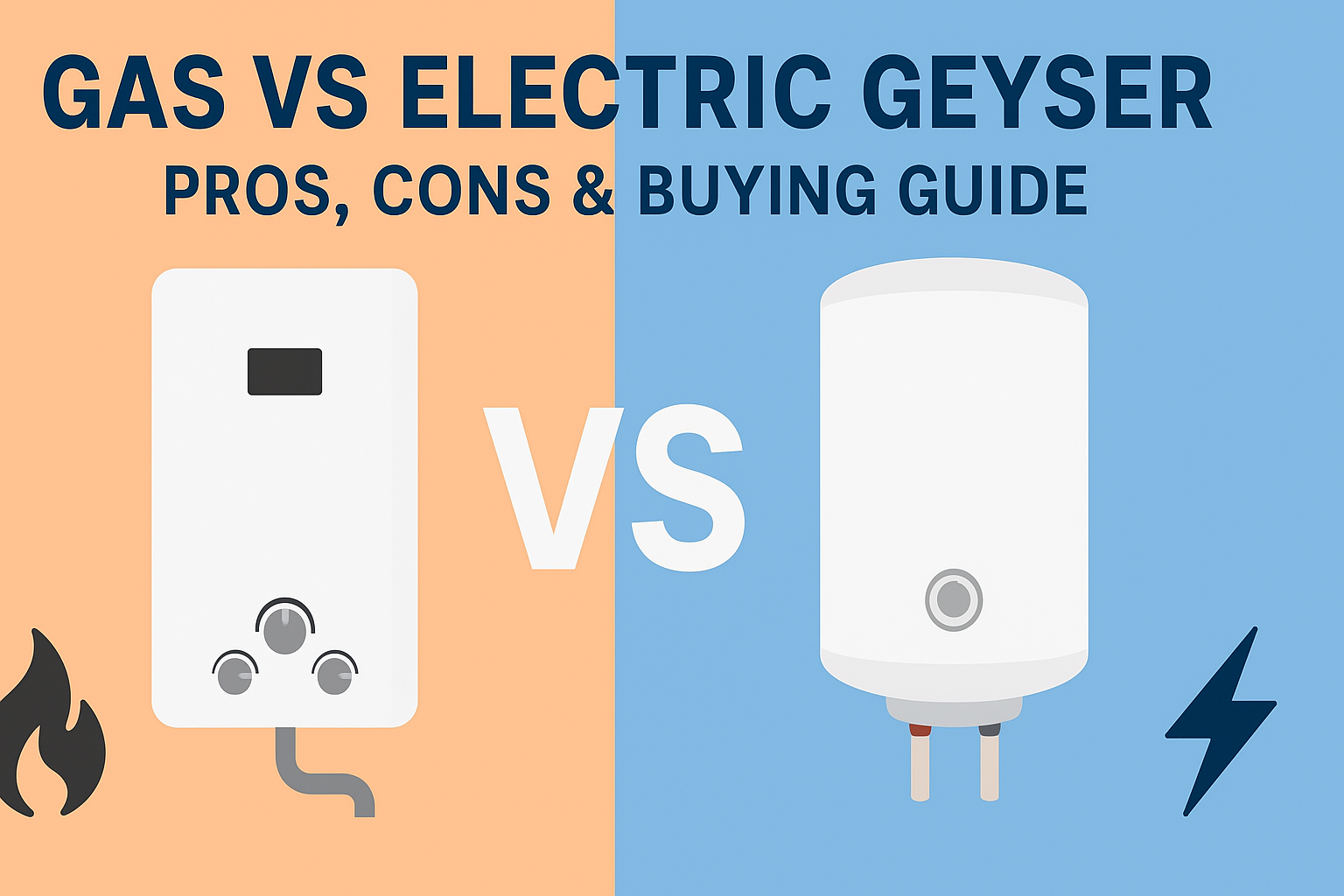When it comes to choosing the right water heater for your home, one of the most common dilemmas is gas vs electric geyser. Both have their own benefits, drawbacks, and ideal use cases. Whether you are renovating your bathroom, setting up a new home, or just looking for a cost-effective solution for hot water needs, making the right choice is important.
In this comprehensive guide, we will compare gas geysers and electric geysers in terms of efficiency, cost, maintenance, safety, and more – so you can make an informed decision.
What is a Gas Geyser?
A gas geyser is a water heating appliance that uses LPG (liquefied petroleum gas) or PNG (piped natural gas) as its fuel source. When you turn on the hot water tap, the geyser ignites the gas burner and heats the water instantly.
Gas geysers are often preferred in areas with frequent power cuts because they do not depend on electricity.
What is an Electric Geyser?
An electric geyser uses electricity to heat water. It comes in two main types:
- Instant Electric Geyser – Heats water instantly as it flows through.
- Storage Electric Geyser – Stores a fixed amount of water and heats it gradually.
Electric geysers are widely popular because they are easy to install, safe, and require very little maintenance.
Gas vs Electric Geyser: Key Differences
Here’s a quick comparison table to help you see the main differences at a glance:
| Factor | Gas Geyser | Electric Geyser |
|---|---|---|
| Heating Speed | Very fast (instant heating) | Moderate (instant or storage) |
| Operating Cost | Lower (if gas is cheap) | Higher (electricity cost) |
| Installation | Requires gas connection & proper ventilation | Easy installation (just electricity) |
| Maintenance | Requires regular servicing | Low maintenance |
| Safety | Risk of gas leaks & carbon monoxide | Very safe, with automatic cut-offs |
| Lifespan | 6–8 years (with maintenance) | 8–10 years |
| Best For | Large families, frequent hot water use | Small families, urban apartments |
Pros and Cons of Gas Geysers
✅ Advantages of Gas Geysers
- Faster Heating – Provides instant hot water without waiting.
- Cost-Effective – Cheaper to run in areas where LPG or PNG is affordable.
- Works Without Electricity – Perfect for areas with power outages.
- Unlimited Hot Water Supply – As long as gas supply is available.
❌ Disadvantages of Gas Geysers
- Complex Installation – Needs proper ventilation to prevent carbon monoxide buildup.
- Safety Risks – Potential risk of gas leaks if not maintained properly.
- Regular Maintenance – Burners and pipelines need periodic cleaning.
- Limited Lifespan – Usually lasts less than electric geysers if used heavily.
Pros and Cons of Electric Geysers
✅ Advantages of Electric Geysers
- Easy Installation – Just plug in and use.
- Low Maintenance – No gas lines, no burners to clean.
- Safe to Use – Built-in thermostat & auto cut-off features prevent overheating.
- Compact and Modern – Available in sleek designs, ideal for urban homes.
❌ Disadvantages of Electric Geysers
- Higher Operating Cost – Electricity bills may increase significantly.
- Slower Heating (Storage Models) – Takes a few minutes to heat the tank.
- Dependent on Electricity – Cannot function during power cuts.
Buying Guide: Gas vs Electric Geyser
Choosing between a gas and electric geyser depends on several factors:
1. Family Size & Water Usage
- Gas geyser: Suitable for large families that need continuous hot water for multiple bathrooms.
- Electric geyser: Best for small to medium families with moderate usage.
2. Location
- If you live in an area with frequent power cuts, go for a gas geyser.
- If you live in a city apartment with easy electricity access, choose an electric geyser.
3. Budget
- Initial cost: Gas geysers are cheaper upfront.
- Running cost: Gas geysers usually cost less to operate where gas prices are low.
4. Safety
- Electric geysers are generally safer since there’s no risk of gas leaks.
- If you choose a gas geyser, ensure proper ventilation and install a carbon monoxide detector.
5. Maintenance
- Gas geysers need regular servicing, whereas electric geysers require very little maintenance.
Which One Should You Buy?
- Choose a Gas Geyser if:
✅ You have a reliable gas connection
✅ You face frequent power outages
✅ You need continuous hot water supply - Choose an Electric Geyser if:
✅ You want a safe, hassle-free, and low-maintenance option
✅ You live in a city apartment with stable electricity
✅ You prefer a modern, compact design
Final Thoughts
Both gas and electric geysers have their pros and cons. If cost-effectiveness and instant heating are your priorities, a gas geyser may be your best choice. However, if you value safety, convenience, and low maintenance, an electric geyser is the smarter pick.
Before buying, consider your family size, budget, and location carefully. A well-chosen geyser can save you money, energy, and ensure comfort for years to come.






